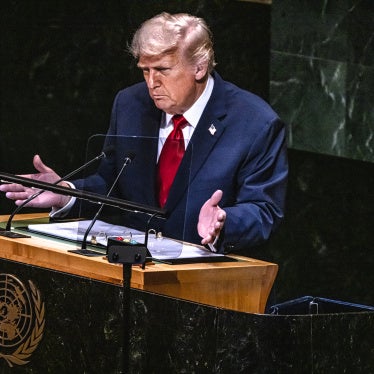(Geneva) – The announcement by the US government that it would not participate in the upcoming UN Review Conference on Racism, followed by the decision of the Netherlands, New Zealand, and Australia to pull out and Germany to attend as an observer, strikes a blow at UN efforts to fight racism, Human Rights Watch said today. There is no justification for the decision because the draft declaration to be adopted at the conference on April 20-24, 2009, fully incorporates the legitimate concerns of EU and other Western governments.
“The sad truth is that countries professing to want to avoid a reprise of the contentious 2001 racism conference are now the ones triggering the collapse of a global consensus on the fight against racism,” said Juliette de Rivero, Geneva advocacy director at Human Rights Watch. “As these Western governments demanded, the negotiated text for the review conference upholds freedom of expression and avoids singling out Israel. But these governments couldn’t take ‘yes’ for an answer and are boycotting the conference anyway.”
The draft document, adopted after preparatory negotiations, contains no reference to Israel or the Middle East and rejects the dangerous concept that religions, as opposed to individuals, could be defamed or have their rights violated. It also reaffirms the singular tragedy of the Holocaust and condemns anti-Semitism. In addition, it fully protects the right to freedom of expression as defined under international law, affirms and strengthens the call for the protection of migrants’ rights, and acknowledges multiple and aggravated forms of discrimination.
Some governments have argued against the document because it reaffirms the 2001 Declaration and Program of Action. However, with the exception of the US, the Western governments now planning to boycott the conference endorsed the prior declaration in 2001. Although the US government boycotted the 2001 conference, and had concerns about language in the proposed text regarding incitement, its concerns could easily have been met through reservations or parallel statements rather than a wholesale boycott of the conference and its important race agenda.
“Governments boycotting the conference have decided to put the concerns of victims last,” de Rivero said. “Instead of isolating radical voices, governments have capitulated to them.”
The review conference taking place in Geneva represented a chance to move beyond the controversy that surrounded the race conference in 2001. The 2009 review should set a positive and constructive vision for the fight against racism. Instead, the boycott decisions took place despite US officials’ acknowledgement that the vast majority of their “red lines” had not been crossed. The Netherlands, New Zealand, Germany, and Australia pulled out of the conference a day before it is due to begin, although the final text produced on April 18 met the remaining demands of the EU states on protecting freedom of expression.
“The boycott plays into the hands of those who want the conference to fail,” de Rivero said. “The only ones celebrating will be those who want to undermine efforts to defeat racism and protect rights.”





